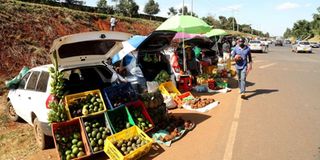2020, the year of Covid-19, and much else

What you need to know:
- There’s a problem, though, which has been noted the world over: ordinary folk are extremely wary of being Covid-19 vaccinated.
- The possible side effects of the vaccines are causing the irrational fear.
The year 2020 will be remembered as a dark one. It was the year of coronavirus, of lockdowns and economic meltdowns across the world.
Pope Francis, speaking during his Christmas day homily from St Peter’s Basilica, sent out a message of hope for the coming year, noting the arrival of Covid-19 vaccines, which he urged be distributed to poor nations and peoples without discrimination. “Jesus was born an outcast. But he came to give us hope,” said the Pontiff.
Distribution logistics – and cost – will determine the speed of availability of the vaccines already in the pipeline to the people of Africa. Health CS Mutahi Kagwe had indicated April as the likely date a vaccine would come on stream in Kenya.
He had in mind the AstraZeneca vaccine, developed jointly with Oxford University, and which is currently undergoing trials in Kenya under the auspices of the Kenya Medical Research Institute.
There’s a problem, though, which has been noted the world over: ordinary folk are extremely wary of being Covid-19 vaccinated. The possible side effects of the vaccines are causing the irrational fear.
Car boot fairs
Covid-19 was not just a health emergency. It messed up livelihoods. Many lost their jobs. The luckier ones who didn’t had to adjust. A new term – “working from home” – entered the language.
Other changes were more wrenching. Employees who had prior stable office jobs were forced to reinvent themselves by selling fruits and vegetables from the boots of their cars along locations like the Nairobi-Naivasha highway. This was a derivation of “car boot fairs”, which are popular in the UK.
A different but no less potent emergency was posed to the Horn of Africa countries – Kenya included – by locusts. The first swarms started building in the neighbourhood of the Red Sea in late 2019, and then swept south from Ethiopia across eastern Africa, wreaking much havoc to crops in 2020. Locusts affect food stocks and are a terrible menace in regions periodically afflicted by drought.
Here in Kenya, the anti-corruption drive seems to have stalled. What became of all those highly publicised investigations and prosecutions? Are the DPP and the DCI all bark and no bite? What about the lifestyle audits? All hot air?
In May, Felicien Kabuga was arrested in his hideout in Paris after 26 years as a fugitive. He is considered the mastermind of the 1994 Rwanda genocide. More than 800,000 souls (mainly Tutsi) perished in that genocide, the most horrifying of its kind in modern Africa. Kabuga’s fate is now in the hands of the residual UN Criminal Tribunal in Arusha.
Former Burundi President Pierre Nkurunziza died in June. Born a Hutu-Tutsi but wholly committed to the Hutu cause, his rule marked a decisive shift from centuries of minority Tutsi power. He joined, and later led, an armed insurrection against the Tutsi establishment that made their continued domination of Burundi untenable.
Also meeting his death the following month was Tanzania’s third president, Ben Mkapa. The amiable former journalist was a key player in helping solve the deadly post-election deadlock in Kenya in 2008. A favourite of Tanzania’s founding leader Mwalimu Julius Nyerere, he was tapped for leadership to supersede his successor, Jakaya Kikwete.
In America, there were the ‘Black Lives Matter’ protests that erupted last May when a black man was extra-judicially killed by policemen in the city of Minneapolis. Soon, the protests went global.
My moment was when protesters in Bristol, England, toppled a statue of notorious English slave trader, Edward Colston, and threw it into River Avon. Colston was a major figure in the Atlantic slave trade that saw millions of Africans shipped in chains and enslaved in the Americas and the Caribbean.
When it comes to politics, the world was reminded that America is not so different from the Third World countries it looks down upon. After President Donald Trump lost his re-election bid in November, he alleged rigging and refused to accept the results. He’s still disputing, and everybody is apprehensive as to what nasty surprise he has in store ahead of the January 20 handover day.
James Bond
A while back, a French cabinet minister cheekily named her cat Brexit. According to her, whenever the cat wanted to get out of the house, she would open the door for it but then, inexplicably, the cat would refuse to step out. This was of course in reference to the shenanigans Britain took the EU through after she voted to exit. After many months of drawn-out talks, a deal was finally struck last month.
Ah, now I must admit to being a lifelong fan of James Bond movies. Harmless, escapist stuff. For me, no actor was as iconic in that role as Sean Connery, a Scot. He passed on in October. One of my most memorable Bond movie lines was in the film ‘Goldfinger’ when Bond is strapped and a laser beam is streaking towards his body.
“You want me to talk?” he asks the villain.
“No, Mr Bond!” replies Mr Goldfinger. “I want you to die!”
Of course, Bond, like the proverbial cowboy, won’t die and will conceive some ingenuity to escape and, ultimately, kill Goldfinger.
@GitauWarigi





